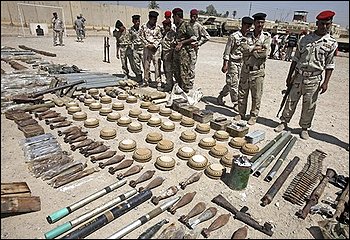A leaked U.S. diplomatic cable said Prime Minister Nouri al-Maliki accused Iran and Syria of arming insurgents in September 2009 – a charge that would add weight to American claims that the neighboring countries were launching pads for violence in Iraq.

Al-Maliki reportedly told then-U.S. Ambassador Christopher Hill during a Sept. 22, 2009 meeting that five Shiite militants had been captured trying to smuggle weapons in the false floor of a Toyota Land Cruiser.
The prime minister claimed the cache included Strela shoulder-fired anti-aircraft missiles, according to the Sept. 27, 2009 memo, which was recently posted on the WikiLeaks website.
The suspects were linked to the Sadrist-affiliated Promised Day Brigade and a special unit of Iran’s Revolutionary Guard known as the Quds Force, al-Maliki said.
“He said the five will be tried and that he hoped each would receive a death sentence,” the cable quoted al-Maliki as saying.
The memo noted that neither the U.S. Embassy nor the military had “indication of any ‘Strela’ missiles being seized recently in Iraq.” But it said Iraqi police had recently arrested five individuals and found four 107 mm rockets, timers and rails hidden inside their vehicle.
“We believe PM Maliki may have been referring to this incident as the circumstances he described match nearly identically the September 17 incident,” the memo said. It was classified by acting deputy chief of mission Gary Grappo.
Government spokesman Ali al-Dabbagh and lawmakers with the parliament’s security and defense committee did not immediately respond to phone calls seeking comment on Thursday.
Shiite militias battled U.S. forces for years and were blamed for some of the worst sectarian bloodshed before al-Sadr agreed to a cease-fire after his fighters were routed in a series of military offensives that led to a drop in violence in 2008.
American commanders often accused Iran of supplying the groups with rockets and armor-piercing roadside bombs. Tehran has consistently denied the allegations.
The memo gave few details about the allegations regarding Syria. It only said that al-Maliki had accused both Damascus and Iran of providing weapons, including the anti-aircraft missiles, to insurgent groups.
Al-Maliki’s government blamed an alliance of al-Qaida in Iraq and Saddam Hussein loyalists it said were based in Syria for Aug. 19, 2009, ministry bombings that killed about 100 people. Iraq demanded that Syria extradite the suspects, but Damascus claimed the allegations were politically motivated and demanded proof.
The two have since boosted ties and agreed to increased economic and security cooperation. WP

Leave a Reply
You must be logged in to post a comment.